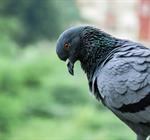
19 Apr 2023 | Apex Environmental Services (UK) Ltd
Bird Control Strategies to Prevent Diseases In Hospitals
If you live in any big city in the UK, you’ll likely already be sharing pavement space with pigeons, seagulls, and other wild birds - as well as the noise, mess, and health risks they bring along with them. While some property owners may simply ignore birds nesting or gathering near their buildings, there’s no such thing as complacency when it comes to hospitals. The presence of birds in healthcare facilities poses significant health risks, as wild birds can spread diseases, leave bacteria-infested guana (aka bird poo) and overall create a pretty unhygienic environment for patients, visitors, and employees.
In the following blog post, we’re going to take a look at various bird control strategies that can be implemented in and around hospital buildings, while also taking a look at just why bird prevention is so important for healthcare facilities. Let’s take a look!
Understanding the risks posed by birds in hospitals
Before taking a look at some of the best birds control strategies for hospitals, it’s incredibly important to understand just how dangerous bird infestations can be in hospitals. Birds, such as pigeons, starlings, and seagulls, carry various diseases and parasites, which can be transmitted to humans either directly or indirectly.
For example, birds can spread diseases through their droppings, feathers, and nesting materials - and you don’t need to come into direct contact with them to end up getting ill. Bird infestations can end up contaminating air-conditioning systems, food, and even water sources, meaning that ill patients - including the elderly and those with weakened immune systems - can end up being severely ill due to airborne or foodborne transmission.
Just some common diseases associated with birds include salmonellosis, E. coli, histoplasmosis, and psittacosis, all of which have a greater impact on those who are already immunocompromised, older, or sick. In addition to this, bird droppings can damage the hospital's infrastructure and lead to slippery surfaces, increasing the risk of on-site accidents and injuries. All things considered, it’s a good idea to nip a bird infestation in the bud right away.
Bird control for hospitals: best prevention methods
So, what are the most effective bird control methods to keep infestations at bay and ensure a healthy, safe, and guano-free environment for your patients and employees? Here are two popular bird control methods we offer at Apex Bird Control:
Anti-bird netting
Anti-bird netting is a versatile and non-lethal method of keeping birds away from hospital premises; this netting can be installed on rooftops, window ledges, air conditioning units, and other areas where birds are likely to perch or nest. The netting serves as a physical barrier, preventing birds from gaining access to the hospital while still allowing air and light to pass through.
Benefits of anti-bird netting
Anti-bird netting offers several benefits as a bird control strategy in hospitals: firstly, it’s an entirely cruelty-free operation, offering a humane solution to infestations. The netting itself doesn’t actually harm the birds, but instead simply deters them from entering the roof of the building, where some birds end up nesting. Secondly, anti-bird netting is a low-maintenance and cost-effective solution, as it’s made from durable materials that can withstand harsh weather conditions and UV radiation. Additionally, the netting is virtually invisible once installed, ensuring that the hospital's clean appearance remains intact.
Cruelty-free bird spikes
Cruelty-free bird spikes are another effective bird prevention method that can be employed in hospitals. These spikes, made from blunt-tipped plastic or stainless steel rods, are designed to prevent birds from landing or nesting on ledges, rooftops, and other surfaces without causing them harm. The spikes create an uneven surface, making it difficult for birds to find a comfortable spot to perch.
Benefits of cruelty-free bird spikes
Cruelty-free bird spikes offer numerous advantages as a bird control strategy in hospitals. Like our bird netting, our bird spikes at Apex Bird Control offer a humane and non-lethal method of deterring birds, ensuring that no harm comes to the animals when protecting buildings and surfaces. In addition to this, anti bird spikes are durable, easy to install, and require minimal maintenance, so they don’t represent a costly or ongoing investment.
Ultimately, the deterrent method you choose will depend on a range of factors, including the scale of the problem as well as the design and height of the hospital building in question. If you’d like to make an inquiry, feel free to contact us on 01256 578025, or send us an email at info@apexbirdcontrol.uk.


